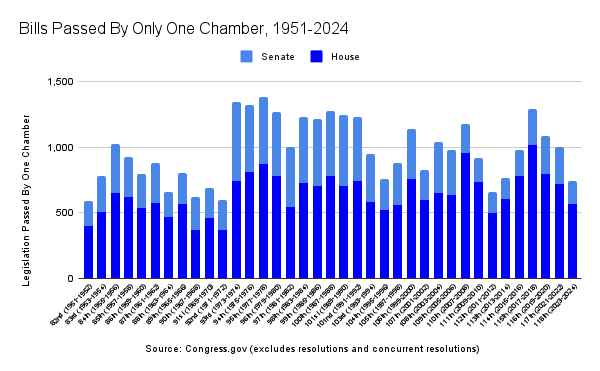An Update on Legislative Activity in the 118th Congress
Only 88 Bills Have Become Law Through September 2024
The 118th Congress has been historically unproductive. The record low for legislation passed in a Congress since 1951 is 284 in the 112th Congress. Back in December, I published a post on legislative activity in the 118th Congress. At the time, only 30 pieces of legislation passed by Congress had been signed into law. That number is now 88.
As I wrote in December, I’m not arguing that Congress should pass more laws. I would rather Congress form bipartisan consensus on major problems that face the United States, from skyrocketing deficits and debt, modernizing Medicare and Social Security, addressing the age demographic crisis, and immigration reform. Addressing those problems, even in a bipartisan way, is incredibly difficult in these hyperpartisan times. In other words, I ain’t gonna get my way.
However, the public tends to view legislative activity as one sign of the productivity of Congress. Today, much of what Congress—the House, in particular—does is focus on messaging bills that make the base of their party happy. Republicans and Democrats are guilty of this. But if you’re a conservative, if you want bills passed related to the culture war or whatever issue is hot in the conservative movement, those bills have to become law.
What legislation has the 118th Congress passed that became law? Most of the legislation is inconsequential. This is because of the close margins in both chambers, especially in the Senate. (Most legislation passes the Senate by unanimous consent or voice vote.) For example, 11 bills signed into law named federal buildings, including post offices.
More “consequential” are the six bills related to appropriations. This includes the Consolidated Appropriations Act for FY 2024, H.R. 4366, which passed in March, and four continuing resolutions (CRs). In fact, one of Congress’s last items before packing it in for the October recess was the passage of a CR, H.R. 9747, that runs through December 20. Appropriations bills shouldn’t be considered consequential. This is a routine function of Congress that appropriates roughly a quarter of federal spending. It shouldn’t be a big deal, but hyperpartisanship has made it a big deal. There’s also the debt limit and discretionary spending caps via the Fiscal Responsibility Act, H.R. 3746, which became law in June 2023. The Fiscal Responsibility Act is probably the most significant legislation passed in the current Congress.
I reviewed the data for the 118th Congress and updated the historical comparisons. Now, I need to note some distinctions I’ve made in the data this time. I included “private legislation” in the data when I published my original post. These bills essentially respond to a matter for an individual or entity. Private legislation has become increasingly rare. In the early part of the data, the number of private legislation passed and signed into law inflated the total number of enacted bills. Thus, I’m creating two versions of the chart, one that includes private legislation and one that excludes it.
And below, you can see the decline of private legislation.
Now, the House and the Senate have passed more bills than those that have become law. The 118th Congress ranks sixth overall in legislation passed by only one chamber. The other chamber hasn’t yet taken up these bills. I recall several years ago, Speaker Paul Ryan (R-WI) criticizing the Senate for not taking up House-passed bills. Of course, most of those bills were partisan in nature, so the Senate getting three-fifths for cloture wasn’t going to happen. Ryan knew that.
When you talk to people on the Hill, Republicans and Democrats alike, they recognize the problem but don’t have any solutions. The solutions are more electoral than legislative. That’s an entirely different post. The good news is the recognition. The bad news is that the margins in the 119th Congress, which begins on January 3, are more likely than not to be just as close as the current margins.






